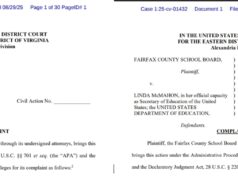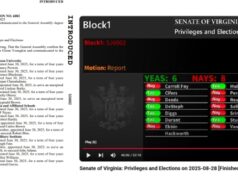I am a teacher. You know, one of those about whom you and your Secretary of Education say are so important to our young people. If only I – and thousands, perhaps millions of other teachers – could believe those words.
There are things your administration has done that we respect, at least most of us. The American Reinvestment and Recovery Act meant large numbers of teachers and other public employees did not lose their jobs. Under ARRA, for the first time ever the Federal government for two years just about met its commitment to provide 40% of the average additional costs imposed by the Individuals with Disabilities Education Act. There was also the $10 billion in funds to support local government employment that also save some jobs. We acknowledge these things.
If only the policies your administration advocates were similarly supportive of teachers and what we see as the best interest of our students.
There are words – Secretary Duncan saying to Roland Martin of NBC
The best thing that happened to the education system in New Orleans was Hurricane Katrina.
and the Secretary and you approving of the firing of all the teachers at Central Falls High School in Rhode Island. Things like these do not give us confidence that your administration has the best interest of students at heart, and give us great pause in thinking that you really care about teachers.
Would these were our only concerns.
We look at Race to the Top, pushed through without vetting for specific policies by the Congress, and see destructive things being forced upon our schools. None of the four acceptable methods for “failing” schools has a base of research showing that it improves education for students, and those tried in Chicago while Secretary Duncan ran those schools did great harm, as local reporting and studies in Chicago have demonstrated. Insisting that states lift caps on charters without controls for qualities has allowed unscrupulous operators and others (including some governors and mayors) to shift massive amounts of public dollars into settings where the operators receive exorbitant salaries, where hedge funds profit from real estate deals, where teachers can be discharged without basic due process protections, yet the most exhaustive studies of charters show that they do not perform better than the public schools from which they draw, despite in many cases being able to cherry-pick their student bodies – not taking those harder to educate, being able to “counsel out” those not performing as well.
The Congress would not act on your Blueprint for Education because it saw many problems. Now the Secretary is acting unilaterally without them. Yes, it is true, as people had said for years, that the timetable on No Child Left Behind would lead to the vast majority of our schools failing to make the artificial target of Adequate Yearly Progress – when a school like New New Trier High School in Winnetka IL fails to achieve AYP because of a few special education students and the school in which I teach by one student, there is something clearly wrong with the formula. Yet the requirements for getting the punitive sanctions waived at a state level requires states to make even more commitments that are damaging to the best interest of students.
Let’s be clear. Most teachers simply want to serve America by teaching our students. We do jobs for which we are paid less than our compatriots with similar education and skills. Most of us work many hours that are not compensated: we may not be teaching during the summers, but often we are taking jobs or that is when we fulfill the educational commitments we must make to keep our certification. During the school year our assigned hours may only be 7.5 for each school day, but we often spend another 2-3 in correcting papers and tests, in planning, in contacting parents.
America’s schools were NOT failing in comparison to other nations. That was not true in 1983 when the Reagan Administration issued A Nation At Risk and it is not true today. Our schools with less than 10% of their students in poverty outperform Finland as a nation, with only 4% of its students in poverty – and Finland provides healthcare to every single person in the nation. Those are the results of the latest tests from OECD, PISA, on which if a nation’s scores were adjusted for percentage of students in poverty the US performed as well as any other nation.
We have problems in America, but most of them originate outside of the classroom and cannot be fixed in the classroom, in the schools.
Meanwhile your insistence on saying how schools are failing and focusing on the economic aspects of public education entirely misses what we know to be important for our students: their individual well-being, something that goes far beyond preparing them for the workplace.
You say that children should learn music, and art, and history, but your policies only continue what began under NCLB: a narrowing of the curriculum to what is tested for high stakes purposes. The National Assessment of Educational Progress shows that our students are going through our schools without learning about government, history and civics, because those are not tested for AYP. Now states that have signed on to the Common Core Standards are telling teachers in social studies that they must be planning their lessons to support those standards, even though (1) the original planning of the standards was without input from teachers (but a lot from think tanks and those involved with testing), and (2) do not include in their construction basic skills and knowledge relevant to the social studies.
I am a social studies teacher. I know that you will say the standards were not imposed by the federal government, nor are the common assessments being prepared by two consortia. That is true, but your education department has offered support, both verbal and financial, for the efforts that are involved.
You may well get reelected because of an improving economy and the weakness of the current field of Republican opponents. And it is true that both teachers unions have offered early endorsements for your reelection.
But understand this: many, many teachers will not support you this time around, and if the election is close that could wind up being very costly. Many teachers volunteered on your behalf, gave contributions from their limited resources. Now? Some may still vote for you, but will not try to persuade others to do likewise. Some may turn out to vote in other races, which means at the last minute they may hold their noses and vote for you. But they may not.
Too many will simply not vote as things currently stand. They supported you in hope. They supported you because in your campaign in 2008 you said those of us supporting you would have a voice – not just in education, but in health care, in other policies as well.
The political reality is many teachers are not only disappointed in your administration and its policies, they are angry.
As bad as that is, there is something worse that is happening: teachers who planned to continue teaching are now leaving the profession. They are not encouraging others to join the profession. Those who are still relatively young in their careers are increasingly deciding not to make it a life choice, and leave for other options, options where they are not subject to the verbal abuse and lack of respect they see from many sources, including the policies of your administration.
A man I greatly respect has the following as his sig, the words that accompany his name each time he posts a comment at the website where I am posting this: Don’t tell me what you believe, show me what you do and I will tell you what you believe. We look at what your administration does in education and we are angered, saddened, disillusioned.
I will be 66 in May. I came to teaching in my late 40s. I had planned to stay in the classroom until I was at least 70, perhaps even another 5-10 years beyond that, as long as I felt I could teach with integrity.
Now? As of now I do not know if I will return for even one more year. I see what is happening in education and I am not sure I can any longer teach with integrity.
The policies of your administration are a major contributor to my current indecision about continuing to teach. In my case, as a teacher of government, I have real concerns about policies in areas other than education: I’m not quite certain what the government is anymore.
It is, however, the policies in education that most contribute to my doubting that i can continue to teach with integrity, not when your administration continues to emphasize testing (even as you offer verbal words about multiple measures), when your administration continues to push charters, when your administration so emphasizes STEM that the effect is to diminish the social studies, English, the arts. . .
I am not only a teacher, I am also a Quaker. Your daughters attend one of the best schools in the nation, Sidwell Friends. I have no objection to your choosing that wonderful school for them. I have friends who teach there, I have friends who attended Sidwell. A previous headmaster, Earl Harrison, was a good friend. I admire the school greatly.
Why should your children be able to get an education with emphasizes the individual students, which does not measure teachers by tests, which does not subject students to a testing regime that is out of control, which has class sizes and teacher loads of students that are reasonable – all things I support – while your administration insists upon policies that are contrary to just about every one of these things?
If you are President of all of the American people, why are not all of our children entitled to the quality of education your children are receiving?
I hear that question not only from Quakers like me, but from ordinary teachers, who wish they could provide that kind of education to the students entrusted to their care.
Mr. President, I want you to succeed. The candidates from the other party scare me, not just on education, but on matters of war and peace, on the social agenda they would impose upon the rest of us.
Last cycle my wife and I contributed to your election. We volunteered. I advocated forcefully on your behalf.
Mr. President, please explain why I, or any other teacher, should do any of that when you have so disappointed us? Please do not argue about the lesser of two evils, of how much worse the other side would be. You are too intelligent to insult teachers with that kind of reasoning.
You ran on a campaign of hope and change. We see the change, and we are losing hope – for our profession, for our schools, for our students, and thus for our nation.
Please listen.
Teachers most want to focus on serving their students. That is why it is rare to see large numbers expressing their anger or their disappointment. Yet increasingly teachers are becoming vocal about how unhappy we are about what is happening. If our anger and our concern is not addressed, then increasingly as well you will see the teachers you do not want to lose walking away from the classroom.
That will hurt our students even more than you can imagine.
The new teachers will lose the ability to turn to experienced teachers for mentoring.
Schools will lose institutional memory, and the ability to build a positive school culture.
The gifted people we want in the classroom will decide to pursue other careers.
I am older. I am of an age where many of my contemporaries have already retired from their careers. I am only one teacher, one person, and my leaving the classroom may seem not to matter all that much. So perhaps my words will seem not to matter.
I am still by most accounts an effective teacher. I could keep working, albeit with decreasing effectiveness given the direction of educational policy that begins with your administration.
That I may well leave the classroom should concern you even more than whether or not I will politically support you.
Remember I am far from alone in my disappointment and my anger.
Will you finally listen to educators?
Will you finally understand that what your administration is doing is permanently damaging our public schools?
If not, why not?
The great Jewish Sage Hillel has a famous statement that applies:
If I am not for myself, then who will be for me? And if I am only for myself, then what am I? And if not now, when?
If I am not for myself, then who will be for me? – As a teacher, I must speak up, for myself, for my fellow teachers, because from our perspective no one else is doing so.
And if I am only for myself, then what am I? – We speak up for ourselves so that we can be for our students, and thus for our society. We do what we do because we care. Most of us could probably make more money doing other things. We have put up with lack of respect and lesser income because we are committed to service.
For each of us there is a point beyond which we will not go.
Many of us have reached that point.
We are crying out, on behalf of our profession and our students.
We are asking you to listen, to hear us.
Which leads to Hillel’s final question:
If not now, when?
We await your answer to our concerns, Mr. President.
We have not yet completely abandoned hope.
But the time left is very short.














